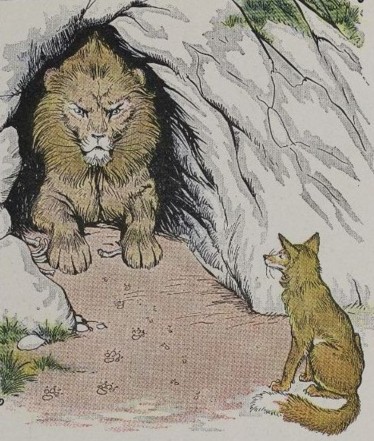PART A_1
Let’s learn vocabulary. Listen and repeat the words and the sentences with your tutor.
PART A_2
| 1. pretend | /pri-TEND/ |
| -to behave as if something is true when it is not | |
| The child pretended to be asleep when her mother peeped through his door. | |
| 2. sympathy | /SIM-pa-thi/ |
| -when you show that you understand and care about someone’s problems | |
| She talked to the typhoon victims with sympathy. | |
| 3. cautious | /KO-shus/ |
| -taking care to avoid risks or danger | |
| After the accident, she has become more cautious in riding public vehicles. | |
| 4. inquire | /in-KWAYR/ |
| -to ask for information | |
| After finishing the first step of the application process, she inquired about the next steps. | |
| 5. wisely | /WAYZ-li/ |
| -in a wise way | |
| People should vote wisely to improve the systems of the government. |
PART B_1
Let’s read the story. Please read them aloud, and I will check your pronunciation and intonation.
PART B_2
The Old Lion and the Fox

An old Lion, whose teeth and claws were so worn that it was not so easy for him to get food as in his younger days, pretended that he was sick. He took care to let all his neighbors know about it and then lay down in his cave to wait for visitors. And when they came to offer him their sympathy, he ate them up one by one.
The Fox came too, but he was very cautious about it. Standing at a safe distance from the cave, he inquired politely after the Lion’s health. The Lion replied that he was very ill indeed, and asked the Fox to step in for a moment. But Master Fox very wisely stayed outside, thanking the Lion very kindly for the invitation.
“I should be glad to do as you ask,” he added, “but I have noticed that there are many footprints leading into your cave and none coming out. Pray, tell me, how do your visitors find their way out again?”
Take warning from the misfortunes of others.
PART C_1
Let’s answer comprehension questions. Please answer them based on the story.
PART C_2
| 1. | Why was the Lion staying in the cave? |
| 2. | How was the Lion able to feed himself still? |
| 3. | Why did the Fox refuse to step closer to the Lion? |
PART D_1
Let’s discuss the story. Please answer the questions below and express your opinions.
PART D_2
| 1. | What would happen if the Fox stepped closer to the Lion? |
| 2. | What could the Fox do to help other animals put an end to the Lion’s scheme? |
| 3. | How can you tell if someone is lying? |
| 4. | How can we take warning from the misfortunes of others? |
| 5. | Aside from giving us a warning, what else can we get from the misfortunes of others? |
REVIEW AND FEEDBACK
Now, let us review the things that you learned in this lesson.
ではこのレッスンで学んだことを振り返りましょう。
(Please give a short feedback on how your student did on your class.)
| Grammar 文法 |
Pronunciation 発音 | Vocabulary 単語 |
Comprehension 理解 |
|
|---|---|---|---|---|
 GOOD GOOD |
文法の誤りはほとんどなく、完全な文章で話すことができる | ほとんどの単語をはっきりと正しく発音することができる | 習った表現を適切に使うことができる | 文章を理解し、質問に正しく答えることができる |
 FAIR |
文法の誤りはあるが、完全な文章で話すことができる | 発音の練習が必要な言葉がいくつかある | たまにミスはあるが、習った表現を適切に使うことができる | 文章を完全に理解するのは難しく、質問に正しく答えられないときもある |
 POOR |
文章で話すのは難しく、単語だけで話すことができる | 発音の練習が必要である | 習った単語と表現を少しだけ使うことができる | 文章を理解するのは難しく、質問に答えるのは難しい |
nk”>The Project Gutenberg.
This eBook is for the use of anyone anywhere a
Parts of this lesson material are based on:
An eBook from The Project Gutenberg.
This eBook is for the use of anyone anywhere at no cost and with almost no restrictions whatsoever. You may copy it, give it away or re-use it under the terms of the Project Gutenberg License included with this eBook or online at www.gutenberg.org
An eBook from The Project Gutenberg.
This eBook is for the use of anyone anywhere at no cost and with almost no restrictions whatsoever. You may copy it, give it away or re-use it under the terms of the Project Gutenberg License included with this eBook or online at www.gutenberg.org